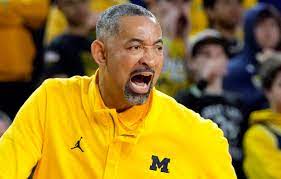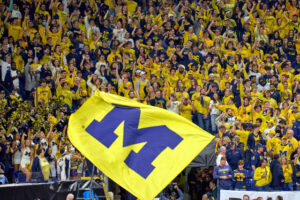
It would be simple to compile a long list of mistakes that Juwan Howard made while leading the Michigan men’s basketball team; in fact, I have already written about them just two weeks ago. The program he was assigned to head in 2019 has rapidly deteriorated over the last two seasons, a decline that culminated in his dismissal on Friday.
The action was justified. It was time for the Wolverines to pick a new leader because they haven’t performed well enough. The writing was on the wall, and Michigan athletic director Warde Manuel saw it—whether it was due to a historically poor 8-24 season or an investigation by an outside party into the program’s culture. The program will have a new face and allocated parking spaces outside Crisler Center will have new names on them. That’s the way things work in this industry.
However, Juwan Howard’s impact at Michigan goes far beyond the challenging final two years of his head coaching career. It goes much beyond his five complete years as head coach, which include, dare I say it, appearances in the Elite Eight, Sweet 16, Big Ten Championship, and AP Coach of the Year Awards. It goes back to when he was a member of the Fab Five, helping to establish Michigan men’s basketball as a national powerhouse.
Howard shouldn’t be defined by how things broke apart, even though it is how he should be remembered. His season-long demands for a job were granted on Friday. It makes natural that he became a pariah for this season’s garbage show, as he was the program’s face.
But that’s now behind us. Now that the season and his tenure are over, it is appropriate to cease demonizing Juwan Howard. He’s leaving this role behind, and you should too. If you’d like, say he damaged the program. If you would want, watch YouTube highlights of your preferred John Beilein teams. However, you can’t say he destroyed everything if you don’t also recognize the things he helped to create.
As fast as some people are to forget about it, Howard was a member of the Fab Five, which is Michigan men’s basketball’s most illustrious feature. Michigan’s contribution to the packed potluck of men’s college basketball history is the Fab Five. Tom Izzo from Michigan State is here. The legendary rivalry between Duke and North Carolina, unique settings, and legendary coaches who have lately transferred the baton to adored alums are all brought along. John Wooden and a record-tying 11 National Championships are brought by UCLA. Indiana is known for its famous Assembly Hall, its basketball-related history, and the Bob Knight scandals. Michigan also contributes the Fab Five.
No, not John Beilein, God bless him. Unlike Trey Burke, who was entertaining to watch. And certainly not Crisler Center—that place lacks personality and is boring. Michigan men’s basketball is known as the Fab Five.
Even if they were flawed, the other four Fab Five members are regarded as Michigan legends for having been a part of it. Perhaps an additional timeout would put them in an even better position. In any case, they are regarded among the highlights of Michigan’s legendary athletics past. That shouldn’t exclude Juwan Howard.
He shouldn’t have to have to punish his legacy by trying to give Michigan even more. The remaining four members of the Fab Five have chosen to continue their careers in Michigan from a distance by not returning to work in Ann Arbor. After a fruitful career as an NBA player and coach, Howard returned to the Wolverines with the intention of giving Michigan even more, and for a while, he succeeded. At one point, just one shot separated the Wolverines from the Final Four as they continued to win.
However, he also granted his alma mater some less glamorous moments. He had a falling out with Wisconsin assistant coach Joe Krabbenhoft, had trouble building rosters, and allowed Michigan to finish last in the Big Ten. Since he is such a well-known Michigan personality, everything from his head coaching career—both the good and the bad—came about after he was hired. He made an effort to construct more. He did sometimes, but not always. When defining Howard’s legacy, you don’t have to choose between the two. They can coexist together.
It was time for Juwan Howard to go, but that shouldn’t define his Michigan legacy
It seems that Howard has no hard feelings, and Michigan and its supporters ought to feel the same way. Even if Howard’s actions as a coach have angered many, they must acknowledge that over the course of his Michigan tenure from the 1990s to the present, he has contributed far more to the Wolverines than he has taken away.
Feel free to include his time as a coach in his legacy. It is not necessary to ignore the inadequacies that cost Howard his job. They don’t make up the entirety of his story, and they shouldn’t take precedence over all else he has accomplished at Michigan. because one of Michigan athletics’ biggest exports is still Juwan Howard. He made an attempt to coach, but it ultimately failed. He continued to play for the Wolverines. It started his NBA career, which attracted a lot of elite prospects to Michigan when they committed, and it elevated the program to a competitive level.
Thus, do not handle him as though he were a former coach who ought to remain anonymous in this city. Since he’s not your typical former coach. It’s Juwan Howard. We’ll be happy to see him return if he decides to see the place where the Fab Five were born. Give him affection. When you see him on the Big House screen, give him your support. You can acknowledge that the coaching endeavor was unsuccessful while doing that. Both are available to you.
It was time for Juwan Howard to go, but that shouldn’t define his Michigan legacy






